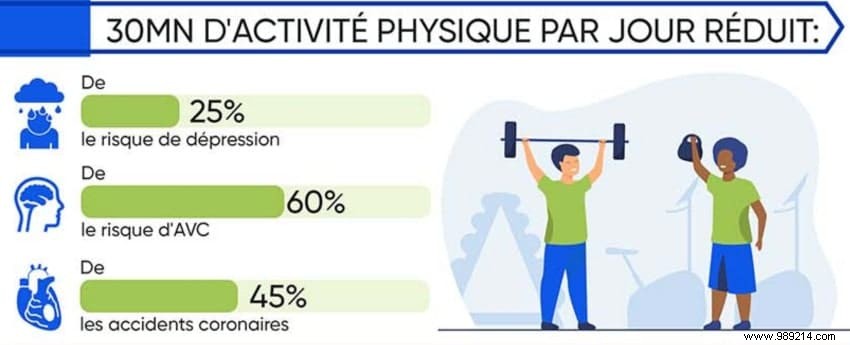Scientific evidence confirms that physical activity benefits people of all ages and genders. Even moderate exercise significantly lowers mortality rates and enhances quality of life. It plays a key role in preventing and managing non-communicable diseases like cardiovascular conditions, diabetes, and cancers, while also alleviating depression and anxiety symptoms.
Physical inactivity ranks among the top health risks. The World Health Organization estimates it contributes to 5% of coronary heart disease burden, 7% of type 2 diabetes, 9% of breast cancer, and 10% of colon cancer cases. Increased global activity could prevent up to five million deaths annually.
Adults should aim for 30 minutes of moderate-to-high intensity cardio-respiratory exercise at least five days a week, avoiding two consecutive rest days. Reducing sedentary time, such as screen-based sitting, is equally vital. Yet, per France's Ministry of Health, only 42.5% of people aged 15-75 meet these health-promoting activity levels.
The WHO defines physical activity as "any bodily movement produced by skeletal muscles that requires energy expenditure." Moderate-to-high intensity activities yield health gains, even if not formal sports—think walking to work, gardening, or vigorous cleaning.
Key benefits include fat loss for weight management, stronger muscles, and denser bones to minimize age-related falls and fractures.

Regular movement at moderate-to-sustained intensity enhances cardio-respiratory fitness. The heart strengthens like any muscle, reducing blood pressure, easing blood vessels, and lowering bad cholesterol and blood sugar. This slashes risks of heart attacks and strokes.
Remarkably, alongside quitting smoking, maintaining healthy weight, and eating well, exercise can offset genetic risks for coronary heart disease. A 2016 New England Journal of Medicine study found these habits reduce risk by up to 46%, regardless of genetics.
Not ready to lace up? Affordable gear—from outdoor apparel to performance trackers—is widely available online and in stores to spark motivation, especially post-New Year's resolutions.
Sports sessions may feel daunting initially, but the post-exercise euphoria is real. Physical activity triggers endorphin release, natural opioids that ease pain, induce well-being, and create euphoria—sometimes leading to a healthy "addiction" to the feeling.
Endorphins reduce pain, fatigue, and stress while lifting self-esteem and morale. For those with depression, regular exercise is a proven, accessible ally.
Practice safely: Tailor intensity to your age and fitness, stay hydrated, warm up properly, and consult a doctor before starting. Sustainable habits deliver lasting health rewards.